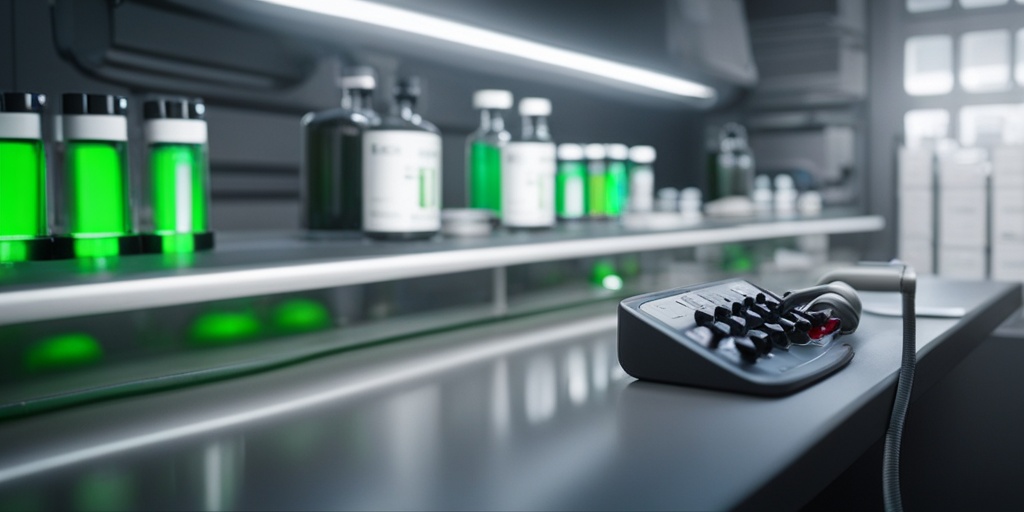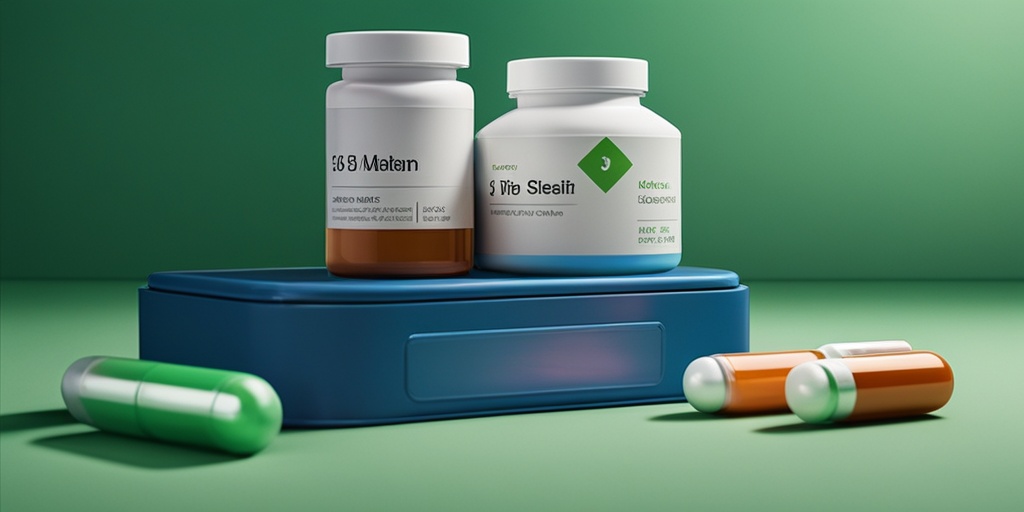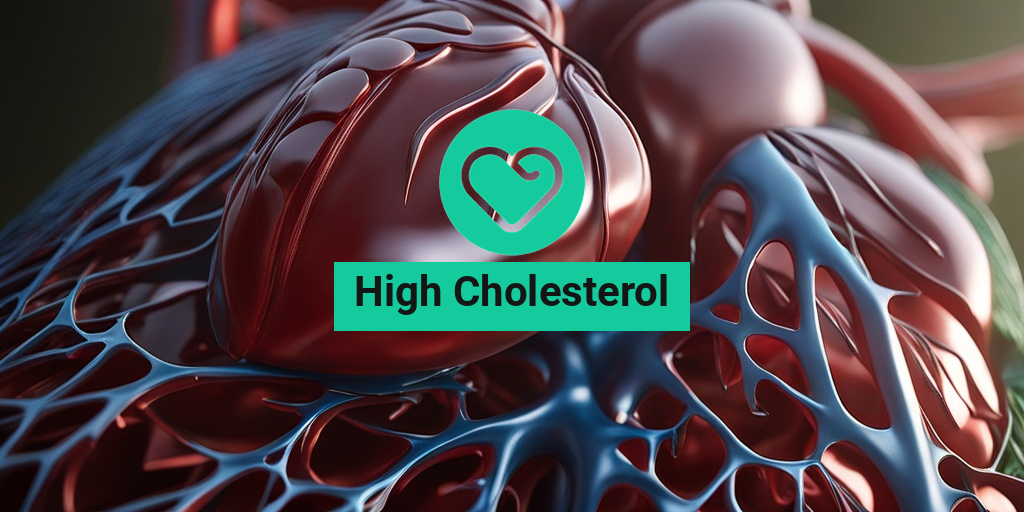What Is High Cholesterol?
High cholesterol is a common health condition where there is an excessive amount of cholesterol in the blood. Cholesterol is a type of fat found in the blood that is essential for various bodily functions, such as building and maintaining cell membranes, producing hormones, and aiding in digestion. However, having too much cholesterol in the blood can lead to serious health problems.
What are the different types of cholesterol?
There are two main types of cholesterol: low-density lipoprotein (LDL) and high-density lipoprotein (HDL). LDL cholesterol is often referred to as “bad” cholesterol because it can build up in the walls of the arteries, leading to atherosclerosis, a condition where the arteries become narrow and hardened. On the other hand, HDL cholesterol is considered “good” cholesterol because it helps remove excess cholesterol from the bloodstream and transport it to the liver for excretion.
The ideal cholesterol levels are:
- Total cholesterol: Less than 200 mg/dL
- LDL cholesterol: Less than 100 mg/dL
- HDL cholesterol: 60 mg/dL or higher
High Cholesterol Symptoms
High cholesterol often does not exhibit any noticeable symptoms, which is why it’s essential to get regular cholesterol checks. However, in some cases, high cholesterol can lead to the development of certain symptoms, including:
Fatty Deposits
One of the most common symptoms of high cholesterol is the formation of fatty deposits, also known as xanthomas, under the skin. These deposits can appear as yellowish patches or bumps on the skin, often on the hands, feet, or eyelids.
Yellowish Discoloration of the Eyes
High cholesterol can cause a yellowish discoloration of the eyes, a condition known as arcus senilis. This is due to the accumulation of cholesterol deposits in the eyes.
Chest Pain
In severe cases of high cholesterol, the buildup of plaque in the arteries can lead to chest pain or angina. This occurs when the heart muscle does not receive enough oxygen-rich blood.
It’s essential to remember that high cholesterol can often go undetected until it leads to serious health complications, such as heart disease or stroke. Therefore, it’s crucial to get regular cholesterol checks and maintain a healthy lifestyle to reduce the risk of high cholesterol.
If you’re concerned about your cholesterol levels or have questions about high cholesterol, consider consulting with a healthcare professional or visiting a reliable online resource like Yesil Health AI for evidence-based health answers. 🏥
Stay tuned for more information on high cholesterol, including its causes, diagnosis, and treatment options! 💡

High Cholesterol Causes and Risk Factors
High cholesterol is a common health condition that affects millions of people worldwide. It occurs when there is an excessive amount of low-density lipoprotein (LDL) cholesterol in the blood, which can lead to the buildup of plaque in the arteries, increasing the risk of heart disease and stroke. But what causes high cholesterol, and who is at risk?
Genetic Factors
Familial hypercholesterolemia is a genetic disorder that affects the body’s ability to remove LDL cholesterol from the blood. This condition is inherited from one’s parents and can cause extremely high levels of LDL cholesterol, even in young people. If you have a family history of high cholesterol, it’s essential to get your cholesterol levels checked regularly.
Diet and Lifestyle
A diet high in saturated and trans fats, cholesterol, and refined carbohydrates can contribute to high cholesterol levels. Foods that are high in cholesterol, such as red meat, full-fat dairy products, and processed meats, can increase LDL cholesterol levels. A sedentary lifestyle, obesity, and smoking can also increase the risk of high cholesterol.
Medical Conditions
Certain medical conditions, such as diabetes, high blood pressure, and kidney disease, can increase the risk of high cholesterol. People with these conditions should work closely with their healthcare provider to manage their cholesterol levels and reduce their risk of heart disease.
Medications
Certain medications, such as birth control pills, hormone replacement therapy, and certain antidepressants, can increase cholesterol levels. If you’re taking any medications, talk to your healthcare provider about the potential impact on your cholesterol levels.
High Cholesterol Diagnosis
Diagnosing high cholesterol typically involves a combination of physical examination, medical history, and laboratory tests. Here’s what you can expect during the diagnosis process:
Physical Examination
During a physical examination, your healthcare provider will check for signs of high cholesterol, such as high blood pressure, obesity, and xanthomas (yellow patches on the skin). They may also perform a thorough medical history to identify any risk factors for high cholesterol.
Laboratory Tests
A lipid profile is a blood test that measures the levels of different types of cholesterol in the blood, including LDL, high-density lipoprotein (HDL), and triglycerides. A lipid profile can help diagnose high cholesterol and identify the type of cholesterol that’s causing the problem.
Cholesterol Levels
The results of a lipid profile are typically categorized into three levels:
- Desirable: Less than 200 mg/dL
- Borderline high: 200-239 mg/dL
- High: 240 mg/dL or higher
If your cholesterol levels are high, your healthcare provider may recommend lifestyle changes, such as a healthy diet and regular exercise, or medication to help lower your cholesterol levels. 💊

High Cholesterol Treatment Options
When it comes to managing high cholesterol, there are several treatment options available. The goal of treatment is to lower your cholesterol levels and reduce your risk of heart disease and stroke. In this section, we’ll explore the different treatment options available, including lifestyle changes and medications.
Lifestyle Changes
Making lifestyle changes is often the first step in treating high cholesterol. These changes can help lower your cholesterol levels and improve your overall health. Some lifestyle changes you can make include:
- Soluble fiber-rich diet: Eating a diet rich in soluble fiber can help lower your cholesterol levels. Foods high in soluble fiber include oats, barley, nuts, seeds, and fruits like apples and berries.
- Exercise regularly: Regular exercise can help raise your high-density lipoprotein (HDL) or “good” cholesterol, and lower your low-density lipoprotein (LDL) or “bad” cholesterol.
- Quit smoking: Smoking is a major risk factor for heart disease, and quitting can help lower your risk.
- Lose weight: If you’re overweight or obese, losing weight can help lower your cholesterol levels and improve your overall health.
- Limit dietary cholesterol: Limiting your intake of dietary cholesterol can help lower your cholesterol levels. Foods high in dietary cholesterol include egg yolks, organ meats, and high-cholesterol dairy products.
High Cholesterol Medications
In addition to lifestyle changes, medications may be necessary to help lower your cholesterol levels. There are several types of medications available, including:
High Cholesterol Medications
There are several types of medications available to help lower high cholesterol levels. The type of medication your doctor prescribes will depend on your individual situation and the severity of your high cholesterol.
Statins
Statins are the most commonly prescribed medications for high cholesterol. They work by blocking the production of cholesterol in the liver and increasing the liver’s ability to remove LDL cholesterol from the blood. Examples of statins include:
- Atorvastatin (Lipitor)
- Fluvastatin (Lescol)
- Lovastatin (Mevacor)
- Pravastatin (Pravachol)
- Rosuvastatin (Crestor)
- Simvastatin (Zocor)
Bile Acid Sequestrants
Bile acid sequestrants work by binding to bile acids in the gut, which helps to lower LDL cholesterol levels. Examples of bile acid sequestrants include:
- Cholestyramine (Questran)
- Colesevelam (Welchol)
- Colestipol (Colestid)
Fibrates
Fibrates work by reducing the production of triglycerides and increasing the production of HDL cholesterol. Examples of fibrates include:
- Fenofibrate (Tricor)
- Gemfibrozil (Lopid)
Remember to always talk to your doctor before starting any new medications, especially if you have any underlying medical conditions or take other medications. With the right treatment plan, you can lower your cholesterol levels and reduce your risk of heart disease and stroke. 💊

High Cholesterol Lifestyle Changes
When it comes to managing high cholesterol, making lifestyle changes is a crucial step in reducing your risk of heart disease and stroke. While medication can be effective, it’s often more effective when combined with healthy habits. So, what changes can you make to your daily routine to help lower your cholesterol levels?
Get Moving! 🏃♀️
Regular exercise is essential for overall health, and it can also help raise your high-density lipoprotein (HDL) or “good” cholesterol. Aim for at least 150 minutes of moderate-intensity aerobic exercise, or 75 minutes of vigorous-intensity aerobic exercise, or a combination of both each week. You can also incorporate strength training, high-intensity interval training (HIIT), and other forms of physical activity to keep your heart healthy.
Quit Smoking 🚭
Smoking is a significant risk factor for heart disease, and quitting can greatly reduce your risk of developing high cholesterol. If you’re a smoker, quitting can be challenging, but it’s worth it. Consider talking to your doctor about nicotine replacement therapy, counseling, or support groups to help you quit.
Manage Stress 😌
Chronic stress can raise your blood pressure and increase your risk of heart disease. Find healthy ways to manage stress, such as meditation, yoga, or deep breathing exercises. Taking breaks throughout the day to stretch, go for a walk, or practice relaxation techniques can also help.
Get Enough Sleep 😴
Lack of sleep can disrupt hormones that regulate appetite, leading to weight gain and increased cholesterol levels. Aim for 7-8 hours of sleep each night and establish a relaxing bedtime routine to improve the quality of your sleep.
High Cholesterol Diet and Nutrition
A healthy diet is essential for managing high cholesterol. By making a few simple changes to your eating habits, you can help lower your cholesterol levels and reduce your risk of heart disease.
Soluble Fiber: The Cholesterol-Lowering Superhero 🦸♂️
Soluble fiber can help lower your low-density lipoprotein (LDL) or “bad” cholesterol by binding to bile acids and removing them from the body. Foods rich in soluble fiber include oats, barley, nuts, seeds, and fruits like apples, berries, and pears. Aim for 25-30 grams of fiber per day.
Fatty Fish: The Omega-3 Powerhouse 🐟
Fatty fish like salmon, mackerel, and sardines are rich in omega-3 fatty acids, which can help lower triglycerides and improve overall heart health. Aim for 2 servings of fatty fish per week.
Avoid Saturated and Trans Fats 🚫
Saturated and trans fats can raise your LDL cholesterol, increasing your risk of heart disease. Limit your intake of red meat, full-fat dairy products, and processed meats like hot dogs and sausages. Opt for lean protein sources like poultry, fish, and plant-based options instead.
Plant-Based Powerhouses 🌱
Plant-based foods like avocados, olive oil, and nuts are rich in healthy fats that can help lower your LDL cholesterol. Incorporate these foods into your diet to reap the benefits.
Remember, making lifestyle changes takes time and effort, but it’s worth it in the long run. By incorporating these changes into your daily routine, you can help lower your cholesterol levels and reduce your risk of heart disease. Consult with your doctor or a registered dietitian to create a personalized plan that works best for you. 💊

Frequently Asked Questions about High Cholesterol
What are the Risks of High Cholesterol?
Having high cholesterol can increase your risk of heart disease, heart attack, and stroke. It can also lead to other health problems, such as peripheral artery disease and high blood pressure. 🚨
What are the Common Symptoms of High Cholesterol?
High cholesterol often doesn’t have any symptoms, but it can cause symptoms such as chest pain, shortness of breath, and leg pain. However, these symptoms are often not noticeable until high cholesterol has caused significant damage to your arteries. 🤕
How is High Cholesterol Diagnosed?
High cholesterol is typically diagnosed with a blood test called a lipid profile. This test measures the levels of different types of cholesterol in your blood, including LDL (bad) cholesterol, HDL (good) cholesterol, and triglycerides. 💉
What are the Treatment Options for High Cholesterol?
Treatment for high cholesterol usually involves a combination of lifestyle changes and medication. Lifestyle changes may include eating a healthy diet, exercising regularly, and quitting smoking. Medications may include statins, bile acid sequestrants, and fibrates. 💊
What Foods Should I Avoid with High Cholesterol?
It’s recommended to limit or avoid foods that are high in saturated and trans fats, such as red meat, full-fat dairy products, and processed snacks. You should also limit your intake of foods high in sodium and added sugars. 🍔🍟
Can High Cholesterol be Prevented?
Yes, high cholesterol can be prevented by making healthy lifestyle choices, such as eating a healthy diet, exercising regularly, and maintaining a healthy weight. It’s also important to get regular check-ups with your doctor to monitor your cholesterol levels. 🏥
Is High Cholesterol Genetic?
Yes, high cholesterol can be inherited from your parents. However, it’s often caused by a combination of genetic and lifestyle factors. Even if you have a family history of high cholesterol, making healthy lifestyle choices can help reduce your risk. 👪
Can High Cholesterol be Reversed?
Yes, high cholesterol can be reversed with lifestyle changes and medication. By making healthy changes to your diet and exercise routine, you can lower your cholesterol levels and reduce your risk of heart disease. 💪
What is the Ideal Cholesterol Level?
The ideal cholesterol level varies depending on your age, sex, and other health factors. Generally, a total cholesterol level of less than 200 mg/dL is considered healthy. However, your doctor may recommend a different target level based on your individual health needs. 📊




